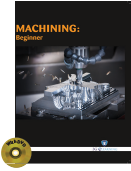Trade and Industrial Education

Machining: Beginner comprehends various diverse practical and visual skills with knowledge of specialized materials and techniques. Machining is a part of the manufacture of many metal products. A person who specializes in machining is called a machinist. A room, building, or company where machining is done is called a machine shop. Machining can be a business, a hobby, or both. This book will introduce the knowledge and skills for those studying and/or working in machining industry to interpret and convey information in response to workplace requirements.
About this Book
The information in this book consists of competencies that a person must achieve to set up and operate a variety of machine tools to perform precision machining operations. Specifically, this book in Machining covers turning, milling, precision grinding and bench work.
About the Machining Industry
Industrial machinery mechanics and machinery maintenance workers maintain and repair factory equipment and other industrial machinery, such as conveying systems, production machinery, and packaging equipment. Millwrights install, dismantle, repair, reassemble, and move machinery in factories, power plants, and construction sites. Industrial machinery mechanics, machinery maintenance workers, and millwrights typically need a high school diploma. However, industrial machinery mechanics need a year or more of training either on the job or through a technical school, whereas machinery maintenance workers typically receive on-the-job training that lasts up to a year. Employment of industrial machinery mechanics, machinery maintenance workers, and millwrights is projected to grow 16 percent from 2014 to 2024, much faster than the average for all occupations. The need to keep increasingly sophisticated machinery functioning and efficient will drive demand for these workers.